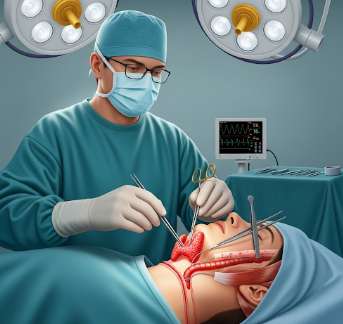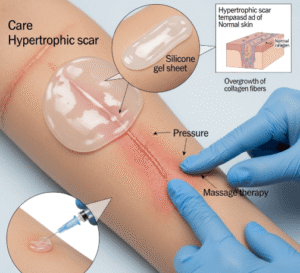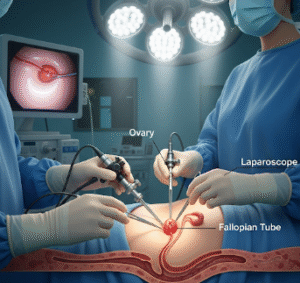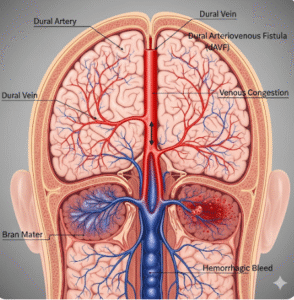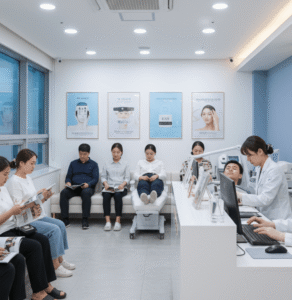Overview
Thyroidectomy is a surgical procedure to remove all or part of the thyroid gland, which is located in the front of the neck. It is commonly performed for thyroid cancer, large goiters, hyperthyroidism, or suspicious thyroid nodules.
In Korea, thyroidectomy is performed in advanced endocrine and head-and-neck surgery centers using modern surgical techniques, including minimally invasive, conventional open, and robotic-assisted approaches, ensuring precision, safety, and optimal recovery.
What is Thyroidectomy?
Thyroidectomy involves removing part (lobectomy) or all (total thyroidectomy) of the thyroid gland.
Key indications include:
- ✦ Thyroid cancer diagnosis or treatment.
- ➤ Large or symptomatic goiters causing compression of the airway or esophagus.
- ✦ Hyperthyroidism not responding to medical therapy.
- ➤ Suspicious thyroid nodules with malignancy risk.
Depending on the patient’s condition, surgeons may also perform central neck lymph node dissection to manage thyroid cancer.
What are the Benefits?
Thyroidectomy provides several advantages:
✅ Definitive treatment for thyroid cancer and large goiters.
➤ Symptom relief from neck compression, difficulty swallowing, or airway obstruction.
✦ Effective control of hyperthyroidism when medications fail.
➤ Minimally invasive options reduce scarring and recovery time.
✅ High success rates with expert surgical care in Korea.
✦ Improves quality of life with better neck appearance and functional outcomes.
Procedure Details
1) How should I prepare for Thyroidectomy?
Preparation includes:
- ✦ Medical evaluation: review medical history, medications, allergies, and prior neck surgeries.
- ➤ Imaging: ultrasound, CT scan, or MRI to assess thyroid size and anatomy.
- ✦ Laboratory tests: thyroid function tests, blood count, and coagulation profile.
- ➤ Medication adjustments: stop anticoagulants as advised.
- ✦ Consent and counseling: discuss procedure type (partial or total), anesthesia, risks, benefits, and recovery expectations.
- ➤ Fasting instructions: usually 6–8 hours before general anesthesia.
2) What happens during the procedure Thyroidectomy?
Thyroidectomy is usually performed under general anesthesia:
➤ Step 1: Patient positioned supine with neck extended to expose the thyroid gland.
✦ Step 2: Small incision made in the lower front neck (transverse collar incision) or minimally invasive/robotic approach if indicated.
➤ Step 3: Thyroid tissue carefully dissected, preserving parathyroid glands and recurrent laryngeal nerves.
✦ Step 4: Part (lobectomy) or all (total thyroidectomy) of the gland removed.
➤ Step 5: Lymph nodes removed if cancer is present.
✦ Step 6: Incision closed with sutures or skin adhesive; sterile dressing applied.
Korean surgical centers prioritize nerve preservation, minimal blood loss, and cosmetic outcomes.
3) What happens after Thyroidectomy?
Postoperative care includes:
- ✦ Monitoring: vital signs, bleeding, and airway stability.
- ➤ Pain management: oral or intravenous analgesics.
- ✦ Wound care: keep incision clean and dry; monitor for swelling or infection.
- ➤ Thyroid hormone replacement: required for total thyroidectomy; partial thyroidectomy may need monitoring.
- ✦ Activity guidance: avoid heavy lifting or strenuous activity for 1–2 weeks.
- ➤ Follow-up: surgical review, lab tests, and possible ultrasound to monitor thyroid remnants or cancer recurrence.
Recovery is typically 1–2 weeks for most activities, with full recovery in 4–6 weeks.
Risks / Benefits
Potential Risks:
- ✦ Temporary or permanent voice changes due to recurrent laryngeal nerve injury.
- ➤ Hypocalcemia if parathyroid glands are affected.
- ✦ Bleeding or hematoma formation at the incision site.
- ➤ Infection at the surgical site (rare).
- ✦ Scar formation or keloid (rare with minimally invasive techniques).
Benefits:
- ✅ Definitive treatment of thyroid cancer, large goiters, or hyperthyroidism.
- ✅ Symptom relief from neck compression and difficulty swallowing.
- ✅ Minimally invasive options for reduced scarring and faster recovery.
- ✅ High success and low complication rates in specialized Korean centers.
- ✅ Improved quality of life and cosmetic appearance.
Recovery and Outlook
Recovery after thyroidectomy generally includes:
- ➤ Immediate care: monitoring for bleeding, airway stability, and pain management.
- ✦ Activity: gradual return to daily activities in 1–2 weeks; avoid strenuous activity for 4–6 weeks.
- ➤ Medication: lifelong thyroid hormone replacement may be needed after total thyroidectomy.
- ✦ Follow-up: lab tests and imaging as indicated, especially for thyroid cancer.
- ➤ Long-term outcome: most patients experience excellent outcomes, symptom relief, and good cosmetic results, with normal thyroid function maintained with replacement therapy if needed.
When To Call the Doctor
Contact your healthcare provider if you notice:
⚠ Severe neck swelling or bleeding.
⚠ Difficulty breathing or swallowing.
⚠ Persistent or worsening voice changes.
⚠ Tingling or numbness in fingers (possible hypocalcemia).
⚠ Signs of infection (redness, warmth, pus, or fever).
Best Korea Option / Process
Korea provides world-class thyroidectomy with:
- ✦ Expert endocrine and head-and-neck surgeons skilled in open, minimally invasive, and robotic approaches.
- ➤ Advanced imaging and intraoperative nerve monitoring for safe and precise surgery.
- ✦ Minimally invasive techniques for optimal cosmetic and functional outcomes.
- ➤ Comprehensive pre- and post-operative care, including hormone management and follow-up.
- ✦ Safe and effective procedures for both domestic and international patients.
- ➤ Multidisciplinary care to ensure accuracy, safety, and optimal recovery.
Korean centers ensure patients receive precise, safe, and effective thyroid surgery with minimal complications and excellent long-term results.
Highlights of Thyroidectomy in Korea
- ✅ Minimally invasive, open, and robotic surgical options available.
- ➤ Definitive treatment for thyroid cancer, goiter, and hyperthyroidism.
- ✦ High success rates with nerve and parathyroid preservation.
- ➤ Rapid recovery and excellent cosmetic results.
- ✅ Expert pre- and post-operative care in advanced Korean centers.

